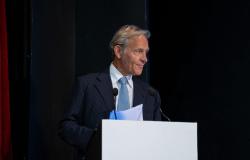
Thinking back to when he began to get involved politically at the age of twenty, one cannot help but think of the unedifying image that the political world offers today.
Published:07-06-2024 17:26
Last update:07-06-2024 17:43
ROME – Enrico Berlinguer himself was well aware of this: “Those who engage in politics expect prison,” he said in his early twenties when he was arrested in Sassari, his hometown. But do you want to make a difference with today’s politicians, with the reasons why they end up in court accused of having taken even a few pennies? 40 years have passed since the fatal rally in Piazza della Frutta in Padua, where the then general secretary of the Italian Communist Party had decided to close the electoral campaign for the European elections. Berlinguer, a moment before inviting the militants to go house to house to ask for the vote, suffered a stroke and died in hospital after 4 days in a coma.
PRISON
A much loved character, still remembered with respect by the political world at a transversal level. In the wake of his death for the first time in Italian history the PCI received more votes of the Christian Democracy. Thinking back to Berlinguer, when he began to become politically involved in his twenties, one cannot help but think of the unedifying image that the political world offers today. With many politicians involved in scandals, thefts, often involved in affairs involving a few thousand euros. Even the young Berlinguer had considered ending up in prison, and he ended up there, but to fight alongside the least fortunate, to change their life of hunger for the better. Born in Sassari in 1922, he had not yet turned 22 when the bread revolt broke out in his city between 13 and 14 January 1944. Thousands of starving citizens attacked bakeries, grain warehouses and oil mills. Among the political organizers was Berlinguer, leader of the young communists of Sassari, who on that occasion found himself against not only the police but also the elders of the Communist Party who were opposed to the revolt. Berlinguer was arrested, locked in an 11 square meter cell with only a small barred window 2.5 meters high. He remained in prison for 100 days, and spent the entire time studying books by great thinkers and politiciansbut he also became passionate about the theater of the great Shakespeare, learning by heart in English all of Hamlet’s monologue “To be or not to be…”.
THE LETTERS
In the end he was acquitted by the judge for not having committed the crime. Everyone has written everything about Berlinguer, even in recent times. I would like to focus on some particular aspects of his political experience and dedicate a section to the letters he wrote during his 100 days in prison. The young Berlinguer, surprisingly, at that decisive moment, influenced by the revolutionary ideas of his uncle Ettorino, writes: “My political theories tend more and more towards anarchism every day”, and then “… on the other hand it is still and perhaps the influence of an integral skepticism is stronger than before in me”. Berlinguer had a great passion for philosophy, as he declared in an interview, as a young man he dreamed of being a philosopher. Once released from prison, his father Mario, a lawyer and former anti-fascist deputy of the Action Party, perhaps frightened by his son’s anarchist vision, he took his son to Salerno to meet Palmiro Togliatti, general secretary of the PCI, of whom he had been a classmate during high school.
THE PCI
From that moment the life of the young Berlinguer changed radically and his political journey began. But he was an atypical communist, a rebel who rebelled against the definitions of his social class, who immediately understood that he had to unite and fight for the greatest popular force. Fabrizio Rondolino, in his album of stories and memories “With our Berlinguer”, reports a fundamental episode: “… In 1956 he had to leave the Federation of Young Communists and leave the party leadership because after the Soviet invasion in Hungary he had the courage to defend , he alone together with Di Vittorio, leader of the CGIL, the Budapest insurgents who opposed Russia”: Heavens Open, he was sent to coordinate the party’s training school. Another stop to his career when he was accused of ‘ingraism’ (Pietro Ingrao, leader of the internal left of the PCI, ed.) in 1966. At the national congress the entire management group was confirmed except for him, who was sent to be regional deputy secretary in Sardinia.
KISSINGER’S STRATEGY
This helps to understand the makings of a politician who also knew how to defend freedom of thought, paying the price. Over time his policy as general secretary distanced himself from the Soviet Union and concentrated on creating the PCI a fully European political force. A winning policy, so much so that the PCI came close to the DC in the 1976 political elections, frightening a political boss in the United States like Henry Kissinger: “… Communists like Berlinguer – Kissinger said to the British Foreign Minister – they are more dangerous than the Portuguese communist leader Cunhal (totally flattened by the Soviet positions, ed.)”. And there is always Kissinger behind the group of specialists who are installed in America with the task of developing the anti-communist operational strategy, graduating the moves according to the various scenarios.
The first part is dedicated precisely, as Filippo Ceccarelli wrote at the time, “how to prevent the PCI from coming into government”. And it is precisely following the fascist coups first in Greece and then in Chile in 1973 that Berlinguer came to define the new political strategy of the Historical Compromise, the agreement between the two main antagonistic political forces, DC and PCI, to resolve the serious problems together. problems that grip Italy. Berlinguer and the president of the DC, Aldo Moro, who was therefore directly threatened by men from the then US administration, found an agreement to collaborate from the outside and then open the government to the PCI. A strategy that the terrorists of the Red Brigades blew up by killing the DC president. To the delight of the Americans like Kissinger and the powerful of the Soviet Union. But as mentioned, it is on the young Berlinguer’s letters from prison that I would like to conclude this recollection. There are 32 letters that Walter Veltroni received from his family and published in his book “When Berlinguer was there”. In the writings we can already see a very varied intellectual formation, not only Marx and Engels but also Tocqueville, Croce, Voltaire, Locke, Poe translated by Baudelaire. Already sober as a young man: “Don’t send too much food – he writes to his relatives – and don’t dramatize my situation”.
“A COMMUNIST-ANARCHIST”
Think of freedom, to be obtained “without humiliation and maintaining dignity, I don’t want to be seen as a victim”. He defines himself by his political vocation “communist-anarchist”. Here are some beautiful and curious passages from his letters. “… It is clear that prison is not paradise, but I feel I can bear it and overcome it with firmness and serenity of spirit. I spend most of my days reading and studying.” The meals that relatives send him “are generally good in terms of quantity and quality. However, send less wine, remember that the thermos must be full otherwise the tea will get cold. No linen for now, I have books and I don’t need any more.” He writes to his father: “Those who associate their destiny with that of an advanced party must be ready to spend a certain period of time in prison. It’s a very normal thing, I don’t want big hype to be made. That would be ridiculous.” “Dear ones, despite the annoying (intentional?) delay of the judge, I always enjoy a good mood… in recent days I have learned Hamlet’s famous monologue by heart in English… The piece is truly sublime. In 33 verses lies the drama, perfectly defined in itself, of every man. It is eternal.” “Here they give us about 2 books a week but they are generally very stupid and heavier than the intelligent ones. Brainy books don’t tire me but at night after dinner I prefer to read something else.”
TO AUNT CARMELA
Finally, a beautiful and joking letter to dear aunt Carmela: “… thank you for the two postcards, strangely devoid of any precautionary advice. Don’t be surprised if God doesn’t answer your wishes. In general he doesn’t even answer those of the Pope, who seems to be close to him. Providence pursues its ways and its means are inscrutable to us… A philosopher said, one of those true ones who had a long beard, that we know nothing. And we can’t be sure of this either. As you can see, being a philosopher is of little use, and it is better to take up horse racing. Yet, only philosophers can know certain things.”
The news on the Dire website can be used and reproduced, provided that the source Agenzia DIRE and the address www.dire.it are expressly cited



